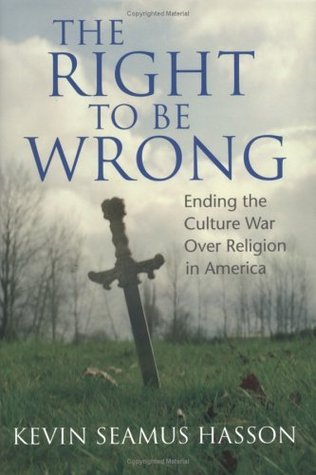In America today, nearly every month brings a new occasion to renew the Culture War over religion in the public square. By next year, our sensitive multicultural elites might insist on celebrating “Hearts and Flowers Day” on February 14 and “Drink Beer and Wear Green Day” on March 17.
Americans have not always been such zealous secularists, Kevin Seamus Hasson, founder and chairman of the Becket Fund for Religious Liberty, argues in The Right To Be Wrong. He ably recounts the surprising religious intolerance of some of our earliest settlers, the Puritans, and with lively descriptions paints an unflattering portrait of their attempts to establish a theocracy in the Massachusetts Bay Colony. (Even their efforts were nothing new in New England: Shortly after the First Thanksgiving, the Pilgrims banned the few Anglicans in their midst from publicly celebrating Christmas.) Religious persecutions did not end with the first generations of Pilgrims and the Puritans; for a hundred years, Quakers were persecuted for their practice of “conscientious objection.”
Hasson identifies two extremes in American history, which are still very much alive today, in the form of “Puritans” and “Park Rangers.” Today’s Puritans are those who, like their namesakes, continue to try to restrict freedom of religion to themselves, the sole possessors of “truth.” When the rest of society refuses to conform to their understanding of truth, these Puritans fall into the same trap as their secularist opponents and argue that truth and freedom cannot coexist. At the other extreme are the politically correct “Park Rangers,” named after California park administrators who banned New Agers from worshiping a parking barrier shaped like a Hindu deity.
According to Hasson, what kept the United States from becoming a Puritan theocracy is what can save us from the politically correct Park Rangers: the First Amendment. If properly understood, Hasson explains, the sort of separation of Church and state suggested by the First Amendment’s Establishment Clause does not imply state-sponsored atheism; yet that is the message the Supreme Court has been sending through its muddled rulings. Indeed, even Justice Sandra Day O’Connor admitted that the lower courts’ application of the Establishment Clause has been “amorphous” and “distorted,” while Justice Anthony Kennedy described the Court’s usage of the same as “flawed in its fundamentals and unworkable in practice.” Most damningly, Justice Antonin Scalia remarked that “we are now so bold that we no longer feel the need even to pretend that our haphazard course of Establishment Clause decisions is governed by any principle.”
Hasson offers a series of humorous, shocking, and infuriatingly outlandish episodes that illustrate the ways in which the Puritans have shaped our contemporary American jurisprudence on the First Amendment. This is not your ordinary constitutional history: Hasson is a skilled storyteller who knows his subject well. For over a decade, he and the Becket Fund have batted a thousand on behalf of religious liberty in U.S. courts, representing clients from a variety of faiths.
What guides the Becket Fund lawyers—and what has been the key to their success—is their commitment to defending individual human dignity. They believe that, as both spiritual and social creatures, men have an inherent right to the free expression of their religious belief in public. Hasson calls the ban on all religion in the public square inhuman, not merely unconstitutional. For him, the debate over religious freedom itself has been muddled, because it has been framed incorrectly: The questions we should be asking, Hasson suggests, are not about the Divine identity but our own. The solution to the multiculturalist dilemma lies not in relativism or militant secularism or in theocracy, but in the recognition of the truth about human beings and the allowance of all religious expression rather than none, notwithstanding the fact that much of it may seem ridiculous, or even repulsive, to many people. Hasson’s essential argument is that, while we may never come to an agreement on spiritual truths, we can find agreement in the truth about human nature. We can have pluralism without relativism: All religions cannot be equally true, but all people can possess an equal right to seek and express the truth. This approach, he believes, could bring a peaceful close to the Culture War here—and, perhaps, elsewhere.
In the book’s final two pages, the author demonstrates the universality of the concept of religious liberty based on individual human dignity. Hasson was invited twice to be a guest on an Al Jazeera call-in show, thanks to his successful defense of two Muslim Newark police officers who had been prohibited from growing their beards by the local Park Rangers. Appropriately, Hasson’s very first caller was “Mohammed-from-Mecca,” who could not understand why this dialogue with the infidel Hasson was permitted in the first place. Mohammed asked, “Why not just wage jihad on him?” In Hasson’s estimation, Mohammed is a “Pilgrim’s Pilgrim.”
What both the Park Rangers and Mohammed the Pilgrim need to learn, he concludes, is that, legally, we all have a right to be wrong. We all are free to believe and even to insist that others are wrong, but we must recognize that each of us has a legal right to hold and express wrong beliefs. “Writ large,” Hasson writes, “that is the solution to the culture war.”
[The Right To Be Wrong: Ending the Culture War Over Religion in America, by Kevin Seamus Hasson (San Francisco: Encounter Books) 176 pp., $25.95]

Leave a Reply